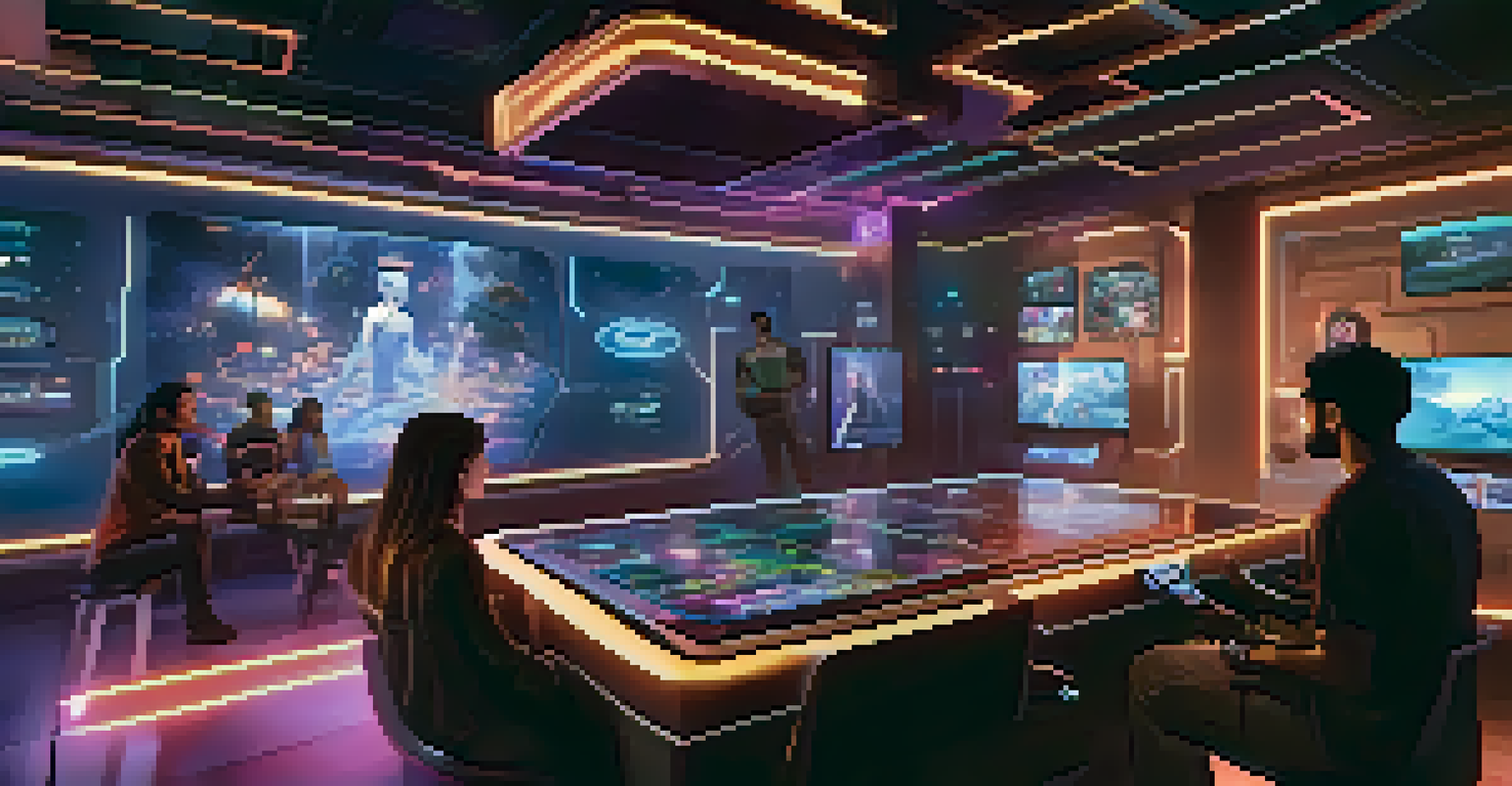AI and Gaming: Creating Immersive Player Experiences Globally

Understanding AI's Role in Modern Gaming
Artificial Intelligence, or AI, is fundamentally changing the gaming landscape. It helps create smarter, more responsive characters and environments that adapt to player actions. This means games can offer unique experiences tailored to individual players, making each session feel fresh and exciting. AI is not just about enhancing graphics; it's about crafting entire worlds that feel alive.
The most exciting part of gaming is the ability to tell stories in ways that have never been seen before, thanks to AI.
For instance, when you play an open-world game, AI algorithms determine how non-playable characters (NPCs) react to your choices. They can be programmed to remember past interactions, making your relationship with them feel real and dynamic. This level of sophistication allows players to immerse themselves in narratives that might change based on their decisions, leading to multiple game endings.
Moreover, AI can analyze player behavior and preferences, which helps developers fine-tune gameplay mechanics. By understanding what players enjoy, developers can create more engaging content that resonates with their audience. This ultimately leads to a richer gaming experience, where the players feel more connected to the game.
Dynamic Storytelling Through AI Technology
One of the most exciting applications of AI in gaming is dynamic storytelling. Traditional games often follow a linear narrative, but with AI, stories can evolve based on player choices and interactions. Imagine a game where every decision you make influences the plot direction, creating a personalized journey each time you play.

This approach not only enhances replayability but also deepens emotional investment. Players can explore different facets of the story, uncovering new characters and plot twists that are only revealed through their unique playthrough. This level of interactivity keeps players coming back, eager to experience different outcomes.
AI Enhances Gaming Experiences
Artificial Intelligence tailors gameplay and storytelling, creating unique and immersive experiences for each player.
Games like 'Detroit: Become Human' showcase this innovation beautifully, where players face moral dilemmas that alter the course of the narrative. Such storytelling techniques make players feel like they are part of an unfolding drama, creating a sense of ownership over the story. As AI continues to develop, we can expect even more sophisticated narrative structures.
Enhancing Player Interactions with Smart AI
AI isn't just about the story; it also enhances player interactions within the game. By employing natural language processing, games can allow players to communicate with characters through voice or text. This creates a more immersive environment where players feel like their input is genuinely valued.
Artificial intelligence is the new electricity. It has the potential to transform every industry, including gaming.
Consider games that feature advanced chatbots or voice-activated commands, where players can strategize or negotiate with NPCs as if they were real people. This level of interaction adds layers of depth to gameplay, allowing for richer experiences and more meaningful connections with the game world.
As AI technology continues to advance, we can expect interactions to become even more fluid and lifelike. This will lead to an evolution in how players engage with games, making the virtual world feel more like a second home and less like a mere escape.
The Impact of AI on Game Development
AI is not just a tool for enhancing gameplay; it also significantly impacts game development. Developers can leverage AI to automate tedious tasks such as bug testing, asset creation, and balancing game mechanics. This allows them to focus more on the creative aspects of game design.
With AI algorithms, developers can analyze player data to refine their creations, ensuring that the final product resonates with the target audience. This data-driven approach leads to higher-quality games that meet players' expectations and demands.
Dynamic Storytelling Revolution
AI allows for evolving narratives that change based on player choices, enhancing emotional engagement and replayability.
As a result, the development cycle becomes more efficient, allowing for quicker releases and updates. This agility benefits players who crave fresh content and keeps the gaming community engaged and excited.
Personalized Gaming Experiences with AI
Personalization is one of the most significant advantages AI brings to gaming. By analyzing player behavior, preferences, and play styles, AI can tailor experiences that resonate with each individual player. This means that no two players will have the same journey, making the gaming experience uniquely theirs.
For example, some players may prefer action-packed gameplay, while others enjoy more strategic, puzzle-solving elements. AI can adjust difficulty levels, suggest relevant quests, or even modify environments to suit a player's preferred style. This customization enhances engagement and satisfaction, leading to a more enjoyable gaming experience.
As more games adopt personalized AI features, players can expect increasingly sophisticated systems that anticipate their needs. This trend will only deepen the bond between players and their games, making them feel more like partners in adventure.
Global Reach: AI Bridging Cultural Gaps in Gaming
AI is playing a pivotal role in making gaming a truly global phenomenon. By utilizing machine learning algorithms, games can be localized more efficiently, ensuring that players from different cultures can enjoy the same experience. This makes gaming accessible to a broader audience worldwide.
For instance, AI can translate dialogue and adapt cultural references in real-time, allowing players to connect with characters on a deeper level. This is particularly important in narrative-driven games where cultural nuances can significantly impact the storytelling experience.
Personalization in Gameplay
Through analyzing player behavior, AI customizes game elements, ensuring a personalized journey that resonates with individual preferences.
As a result, players from various backgrounds can enjoy the same games while experiencing tailored content that resonates with them. This inclusivity fosters a sense of community among gamers, breaking down geographical barriers and creating shared experiences.
The Future of AI in Gaming: What Lies Ahead
Looking ahead, the future of AI in gaming is nothing short of exciting. As technology continues to evolve, we can anticipate even more immersive experiences that push the boundaries of creativity and engagement. AI will likely lead to advancements in virtual reality (VR) and augmented reality (AR), making gaming experiences even more lifelike.
Moreover, as AI becomes more adept at understanding human emotions and responses, we might see games that can gauge player moods and adjust gameplay accordingly. This could lead to adaptive narratives that respond to how players feel, creating a truly personalized journey.

Ultimately, the possibilities are endless. As both AI and gaming technologies continue to develop, players can look forward to richer, more engaging experiences that not only entertain but also challenge their creativity and critical thinking skills.